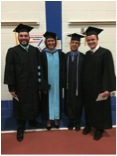[MenTeach: Dr. Jill has been working to increase and retain men in her education program.]
The month of May evokes in me a sense of pride and a renewed passion for the profession of teaching. Perhaps it is due in part to the end of the year activities, or the pomp and circumstance of graduation, or merely the satisfaction of completing another year of teaching! Whatever the reason, I am honored to be called, teacher.
This year in particular, I was especially proud of my role as teacher because I was able to congratulate three male students who received their bachelor degrees in Early Childhood Education! Each student has selected a different path to pursue with his degree; one will pursue his master’s degree in education, one will be teaching second grade, and the third student, who chose to graduate without a license, will pursue a more personal goal. I am proud to know that each of them has chosen to follow his own passion at this point in his life.
When reading over responses on spring course evaluation I was intrigued with the answers to this questions, what do you like most about the professor’s teaching? It delighted my heart when I read the response, “Passion!”
The urban dictionary defines passion, as “more than enthusiasm or excitement but rather an ambitious action whereby one’s heart, mind, body and soul go into something they feel is important.” I have been reflecting upon the degree in which the heart and mind and soul of any teacher is invested in this noble profession and wonder specifically what actions students witness that they consider passionate.
Those who teach with passion possess habits of effective teaching. This passion is seen through their body language, the words they speak and in the inflection of their speech. The practices of a passionate teacher emulates through their interpersonal skills that bring a positive energy into the classroom. Stephen Covey, in his book, Seven Habits of Highly Effective People, notes that any job is twenty percent knowledge and eighty percent interpersonal skills. Some of these interpersonal skills of a passionate teacher include their level of enthusiasm, their smile, or sense of humor. These teachers seem to have a natural ability to engage students in conversation using a ‘teacher hook’, unique to them such as the arts; music, puppets, dance and story telling.
The most effective teachers are those who strategically use their passion to grow personally and professionally in the profession. Their passion ignites them to learn continuously and to find creative ways to present knowledge and content to meet each learner’s needs. These teachers give more than 100% of their time as they engage in and model the cyclical process of learning and reflection. Their open mindedness creates pathways for themselves and their students to high standards that are challenging yet attainable.
Perhaps to my 2016 graduates in early childhood education I have modeled my passion of teaching through some of the above actions and if so, I am pleased. However, I believe that passion for teaching cannot be measured accurately by characteristics or actions. Passion lies so deep within the very heart and soul of a person sometimes it is uncontrollable. I only know that those of us who are truly passionate about teaching have the energy and drive to continue to teach with love and conviction.
“We expert teachers know that motivation and emotional impact are what matter.” –Donald Norman
Resources
Covey, S. R. (2004). The 7 habits of highly effective people: Restoring the character ethic ([Rev. ed.].). New York: Free Press.
11 Habits of an Effective Teacher. (n.d.) Retrieved May 18, 2016, from
http://www.edutopia.org/discussion/11-habits-effective-teacher
What Do Principals Look for in a New Teacher? (n.d.) Retrieved May 16, 2016 from
http://www.educationworld.com/a_admin/admin/admin071.shtml

